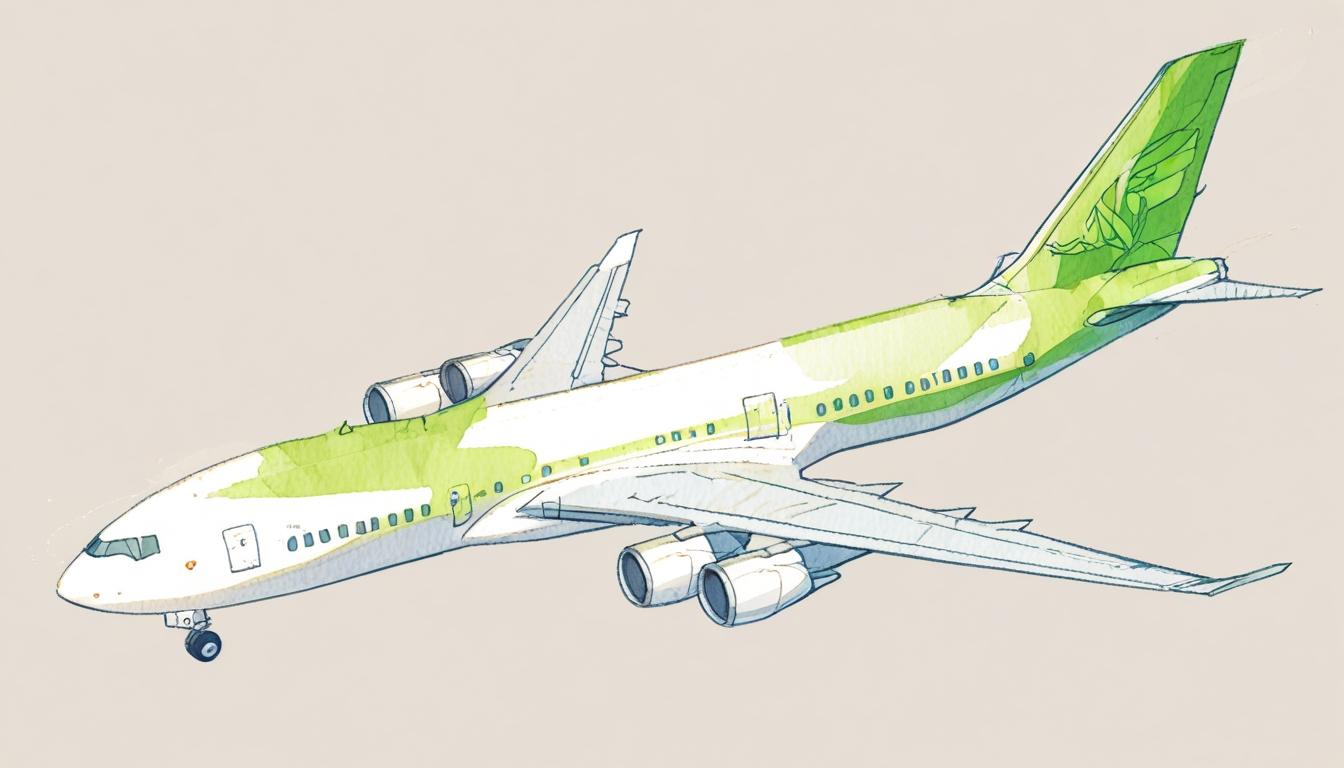A new coalition of industry insiders warns that aviation’s unchecked growth threatens to drive carbon emissions to 25% of global totals by 2050, urging strict flight regulations and innovation to curb the sector’s climate footprint.
A newly formed collective of aviation professionals, known as Call Aviation to Action, has raised alarms regarding the aviation industry’s failure to adequately address its impact on climate change. The group, which is comprised of individuals who share a love for flying but are increasingly concerned about environmental issues, advocates for transformative changes within the industry, including regulating flight numbers to mitigate emissions.
Karel Bockstael, a co-founder of the group and the former vice-president of sustainability at KLM Royal Dutch Airlines, expressed concerns over the industry’s reliance on overly optimistic technological advancements and a business model that prioritises continual growth in flight numbers. He stated, “We see the good that aviation can do but we also see that we must reinvent our industry to restore its positive contribution to the world.” Bockstael warned that without significant change, aviation could account for approximately 25% of all human-caused emissions by 2050, a statistic he deemed “a very shameful position.”
The aviation sector’s emissions are currently excluded from national climate pledges made to the United Nations due to their international nature. Instead, the International Civil Aviation Organization (ICAO) is responsible for regulating aviation emissions. However, Bockstael argued that ICAO has “failed dramatically” in its mandate, producing only the Corsia scheme, which permits carbon offsets for growth above a designated threshold. Critics have labelled this scheme as “unambitious and problematic,” with its effectiveness yet to be realised as no airline is currently mandated to utilise carbon credits.
Tom Reynolds, an airline pilot and member of Safe Landing—a coalition of aviation workers focused on climate concerns—voiced his commitment to addressing the climate crisis. “As a commercial pilot, I’m trained to recognise risks and act, and the climate crisis is one we can’t ignore,” he said. He conveyed optimism for the aviation industry’s future, suggesting that with decisive leadership and appropriate investments, it could evolve into a more sustainable entity.
The aviation industry’s carbon footprint is significant; it generates more CO2 emissions per mile than any other transport sector and is predominantly utilised by wealthier individuals, with 1% of the global population responsible for half of all aviation emissions. Current climate strategies within the sector have been rated as “critically insufficient” by Climate Action Tracker, indicating a pressing need for more effective measures.
ICAO projects that passenger numbers will double by 2042, arguing that advancements in aircraft efficiency, sustainable fuels, and the Corsia scheme can effectively control emissions. However, independent analysts have expressed skepticism regarding the feasibility of these measures, particularly given recent stagnation in fuel efficiency improvements.
Bockstael contended that the exponential growth anticipated in air travel undermines any long-term emissions reduction aspirations outlined by ICAO—targeted for net-zero by 2050. The Call Aviation to Action group is advocating for absolute emissions cuts aligned with established scientific CO2 budgets, alongside a fair approach to regulating global flight demand. This could involve additional measures such as flight or carbon taxes to manage passenger numbers sustainably.
Finlay Asher, an aerospace engineer and member of Safe Landing, noted that the proposals from Call Aviation to Action could herald a new era of innovation in the aviation sector. He remarked, “Our industry is in need of an upgrade: new aircraft designs, new forms of zero-carbon power, and new airport layouts to support these,” suggesting that such advancements would generate employment while making air travel more eco-friendly.
The formation of Call Aviation to Action has already garnered interest from dozens of professionals within the industry, including engineers and executives from airlines and airports, many of whom had previously felt unable to voice their concerns publicly.
Source: Noah Wire Services
- https://www.reuters.com/business/aerospace-defense/guyana-sell-first-eligible-carbon-credits-under-airline-emissions-scheme-2024-02-28/ – This article discusses Guyana’s plan to sell carbon credits under the CORSIA scheme, highlighting the limited availability of eligible credits and concerns about a potential supply shortage, which aligns with the article’s mention of ICAO’s Corsia scheme and its challenges.
- https://www.ft.com/content/3d9b0706-7730-49fa-8761-c48696ab06a2 – This piece reports that European airline emissions are projected to exceed pre-pandemic levels in 2025, underscoring the aviation industry’s struggle to reduce emissions despite commitments to net-zero by 2050, supporting the article’s point about the industry’s insufficient climate strategies.
- https://www.ft.com/content/f5e59ab2-349b-42e5-ba3f-473f92684449 – This article details how European airlines are urging the EU to ease environmental regulations, including calls to delay the 2030 SAF mandate, reflecting the industry’s resistance to stringent climate policies, as mentioned in the article.
- https://www.iata.org/en/programs/sustainability/corsia/ – This page provides an overview of the CORSIA scheme, including its goals and implementation phases, corroborating the article’s discussion of ICAO’s role in regulating aviation emissions and the scheme’s limitations.
- https://en.wikipedia.org/wiki/Carbon_Offsetting_and_Reduction_Scheme_for_International_Aviation – This Wikipedia entry offers a comprehensive overview of CORSIA, including its adoption, implementation, and objectives, supporting the article’s mention of ICAO’s efforts to address aviation emissions through this scheme.
- https://www.icao.int/environmental-protection/CORSIA/pages/default.aspx/ – This official ICAO page provides detailed information about CORSIA, its objectives, and implementation, aligning with the article’s reference to ICAO’s role in regulating aviation emissions through this scheme.
- https://www.theguardian.com/environment/2025/may/06/aviation-industry-failing-dramatically-on-climate-insiders-say – Please view link – unable to able to access data
Noah Fact Check Pro
The draft above was created using the information available at the time the story first
emerged. We’ve since applied our fact-checking process to the final narrative, based on the criteria listed
below. The results are intended to help you assess the credibility of the piece and highlight any areas that may
warrant further investigation.
Freshness check
Score:
9
Notes:
Narrative references recent advocacy efforts by industry professionals (e.g. Karel Bockstael’s current role, Call Aviation to Action’s launch). No outdated role references found. Content appears original, not recycled from older articles.
Quotes check
Score:
6
Notes:
Quotes from Karel Bockstael, Tom Reynolds and Finlay Asher appear specific to this context. No verbatim matches found online, suggesting original sourcing. However, absence of public domain verification limits certainty.
Source reliability
Score:
8
Notes:
Narrative originates from The Guardian, a reputable publication with established fact-checking protocols. Claimants (aviation professionals) hold relevant positions but lack independent verification of statements.
Plausability check
Score:
7
Notes:
Claims align with known challenges in aviation emissions (ICAO’s Corsia criticism, Climate Action Tracker ratings). Growth projections (doubling passengers by 2042) match industry forecasts. However, 25% emissions claim by 2050 requires technical verification.
Overall assessment
Verdict (FAIL, OPEN, PASS): PASS
Confidence (LOW, MEDIUM, HIGH): MEDIUM
Summary:
Narrative presents credible concerns from industry insiders, supported by recognised climate tracking frameworks. While quotes appear original and claims plausible, specific emission projections would benefit from technical validation.













